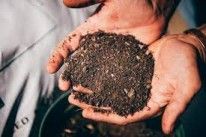When choosing peat-free compost, it's essential for gardeners to read product labels and look for certifications that indicate a commitment to sustainability. Recognized standards such as the "Peat-Free" certification assure consumers that the product is genuinely free from peat.
Introduction: Embracing a Greener Approach to Gardening
In recent years, there has been a growing awareness of the environmental impact of gardening practices, particularly concerning the use of peat-based compost. As a response to this concern, peat-free compost has emerged as a sustainable alternative, offering a myriad of benefits for both gardeners and the planet. In this article, we will delve into the world of peat-free compost, exploring its advantages and why it has become a popular choice for eco-conscious gardeners.
Understanding Peat: The Environmental Concerns
The Importance of Peat Bogs
Peat is a natural resource formed over thousands of years in waterlogged conditions, mainly in peat bogs. These ecosystems are essential for biodiversity, acting as habitats for unique plant and animal species. Unfortunately, the extraction of peat for horticultural purposes has raised environmental concerns, as it contributes to the degradation of these vital ecosystems.
Carbon Sequestration and Greenhouse Gas Emissions
Peat bogs are significant carbon sinks, playing a crucial role in regulating the Earth's climate. When peat is harvested, it releases stored carbon into the atmosphere, contributing to greenhouse gas emissions. Recognizing the environmental impact of peat extraction, many gardeners are now seeking alternatives that are more sustainable.
The Rise of Peat-Free Compost: A Sustainable Solution
Composition of Peat-Free Compost
Peat-free compost is made from a blend of organic materials, such as coir (coconut husk), wood fiber, green waste, and other sustainable ingredients. These alternatives provide the necessary structure and nutrients for plant growth without relying on peat extraction.
Reducing Environmental Impact
By opting for peat-free compost, gardeners contribute to the conservation of peat bogs, promoting biodiversity and preventing the release of stored carbon. This shift away from peat helps preserve these valuable ecosystems and mitigates the impact of horticulture on climate change.
Advantages of Peat-Free Compost for Gardening
Improved Water Retention and Aeration
Peat-free compost offers excellent water retention properties, ensuring that plants receive adequate moisture. Additionally, it provides improved aeration, promoting healthy root development. The combination of coir and other organic materials creates a well-balanced medium for optimal plant growth.
Rich in Nutrients
Peat-free compost is often enriched with organic matter and nutrients, fostering a fertile environment for plants. Gardeners can enjoy the benefits of robust growth without relying on peat, tapping into the nutrient content of sustainable alternatives.
Versatility in Planting Applications
From container gardening to raised beds and flower borders, peat-free compost proves to be versatile in various planting scenarios. Its adaptability makes it a go-to choice for gardeners seeking an eco-friendly option without compromising on performance.
Making the Switch: Practical Tips for Gardeners
Reading Labels and Certifications
When choosing peat-free compost, it's essential for gardeners to read product labels and look for certifications that indicate a commitment to sustainability. Recognized standards such as the "Peat-Free" certification assure consumers that the product is genuinely free from peat.
Experimenting and Adjusting
Transitioning to peat-free compost may require some adjustment, as different blends may behave differently than traditional peat-based options. Gardeners are encouraged to experiment with different brands and mixes to find the best fit for their specific gardening needs.
Sharing Knowledge and Encouraging Sustainability
As the movement towards sustainable gardening gains momentum, sharing knowledge about peat-free compost becomes crucial. Gardeners can play a part in encouraging sustainable practices by discussing their experiences, successes, and challenges with fellow enthusiasts.
Conclusion: Embracing a Sustainable Future in Gardening
Peat-free compost represents a positive step toward a more sustainable and eco-friendly approach to gardening. By choosing alternatives that prioritize environmental conservation, gardeners can contribute to the preservation of peat bogs, reduce their carbon footprint, and enjoy the rewards of flourishing, sustainable gardens. As the horticultural industry continues to evolve, embracing peat-free compost becomes not only a responsible choice but a necessary one for the well-being of our planet.
This article is provided by https://www.provendernurseries.co.uk/product/peat-free-compost-rosedale










*********6@almaxen.com
You’ve nailed it—this is perfection Indian eVisa Requirements from Saint Christopher and Nevis